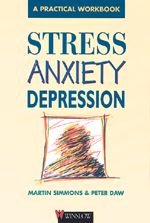 by Martin Simmons and Peter Daw
by Martin Simmons and Peter Daw
This resource will allow clients to work on thier own problems at thier own pace, this excellent handbook recognizes that solving problems is a skill to be learned just like any other.
Full Description:
You will find this an excellent manual for helping to build confidence in relaxation, communicating in relationships, communication with others, and understanding personal choice. It will help the user to overcome guilt, anger, moodiness, depression, stress and anxiety. This manual allows the client to work on their problems at their own pace. It teaches the reader the necessary skills and then guides the use of those skills through organized action plans and programs. Content include: Minds & Bodies; Life Style; Understanding Ourselves; An Anxiety Management Program; Gloom, Sadness & Depression; Growing Further Sample Activity SELF-OBSERVATION Objectives - To begin the process of being objective about ourselves.
- To break down into small components what is actually happening to us.
- To take positive action by recording what we identify.
- To fill in a self-observation chart.
Introduction Observing ourselves is a very difficult process. We all tend to see ourselves according to firmly entrenched prejudices, attitudes and beliefs: - Other people look down on me.
- Things always go wrong for me.
- I will never find what I really want.
People who have personal problems find it toughest to be objective about themselves. They usually blame themselves for everything, exaggerate what is wrong about themselves whilst underestimating their good points or successes. They also only show tolerance towards the weakness of other people, never of themselves. To facilitate self-observation we have drawn up opposite specimen charts which will act as a guide. There are examples of three fictitious situations: (1) A student at his first tutorial begins to feel panicky. His hands are sweating, his heart is racing. (2) An executive finds that the office copying machine has broken down and he screams at his secretary and slams his office door shut. (3) A housewife receives a phone call from her husband who is going to be late home. She bursts into tears. We have provided a blank self-observation chart to be completed at will. Every time a client has an unpleasant experience (for example, losing his temper, bursting into tears, giving up, hitting someone, starving himself or bingeing) he should fill in what happened in the appropriate column. Not everyone will want to do this. The easiest thing is to try and forget it, not dwell on it and get on with something else. However, ignoring the problem does not solve it. There are good reasons to observe and record behaviour: - We cannot learn from something we are trying to forget.
- By recording what is wrong we can stop denying there is a problem.
- If we acknowledge our problems we can learn from them.
Exercise (NB To complete this exercise satisfactorily it is essential to have worked through Chapter 1 'Minds & Bodies'.) Find an example of your reaction to a particular event and fill in the grid below. It is important that you fill in all of the boxes as, later, you will need to try different techniques to cope with your action and thoughts. At first you may draw a blank and feel unable to remember properly the details of the situation you were in. Relax and persevere. If you focus yourself you can get beyond the blocks. Summary In Situations where we lose our temper, have a panic attack, withdraw slightly into our shell, burst into tears and so on there is a complex range of influences affecting us. In order to 'get to the bottom of things' it is necessary to know what we actually did, what we were thinking and what we were feeling. It is not enough to concentrate on only one of these. Self-observation is not an easy process but becoming more objective about ourselves is the most important step in taking control of our lives. Review Remind clients of the objectives listed at the beginning of this part. Have they fully understood and acted upon these? If not, return to the relevant section before proceeding.
172 pages; 8 X 9; spiral bound; reproducable
- Minds & Bodies
- Breathing & Health
- Diet & Exercise
- Sleep & Relaxation
- Physical Factors & Drugs
- Life Style
- Stress
- Setting Goals
- Life Events & Choice
- Understanding Ourselves
- Basic Psychology
- Self-Observation
- Coping
- Understanding Others & Understanding Ourselves
- An Anxiety Management Program
- Gloom, Sadness & Depression
- Understanding How & Why
- Working with What We Do
- Working with Thoughts
- Growing Further
- Communicating Clearly
- Relationships
- Meditation
- Conclusion
- Further Reading
- Useful Names & Addresses
- Index
Stock- Usually ships in 2-3 business days!
|